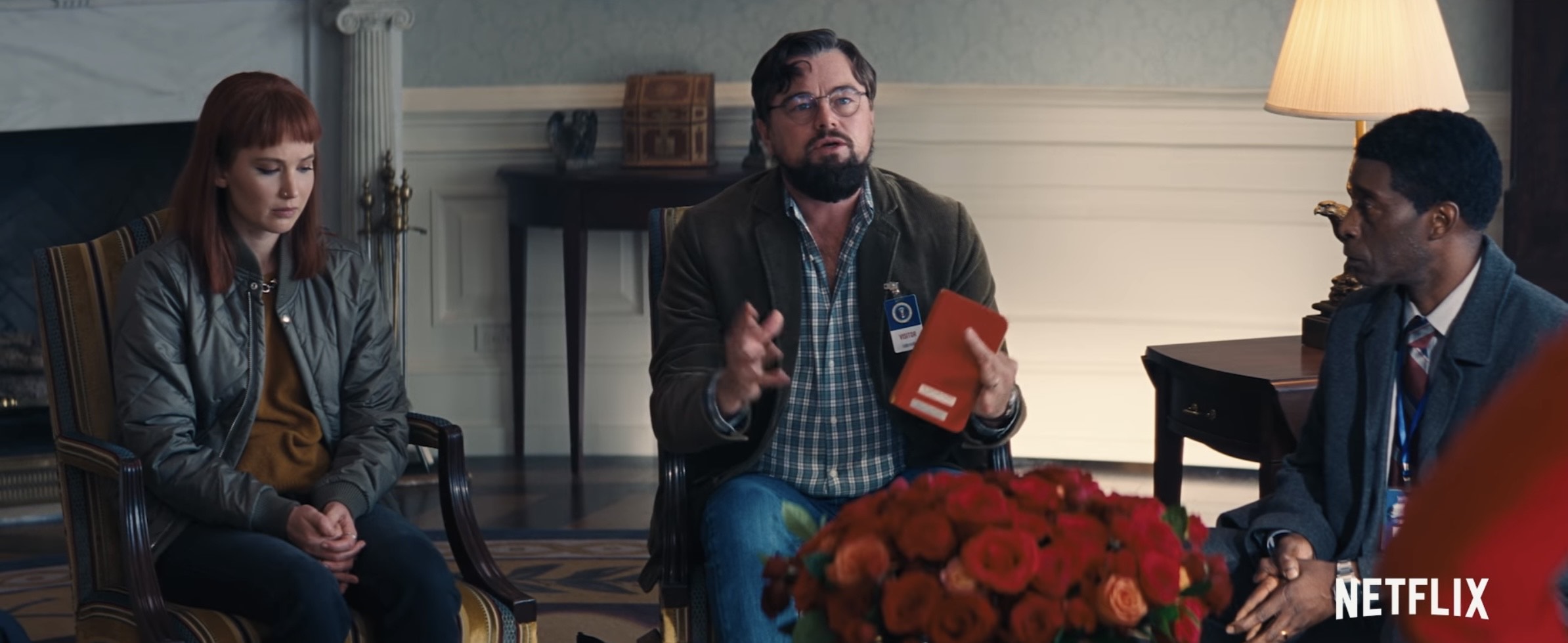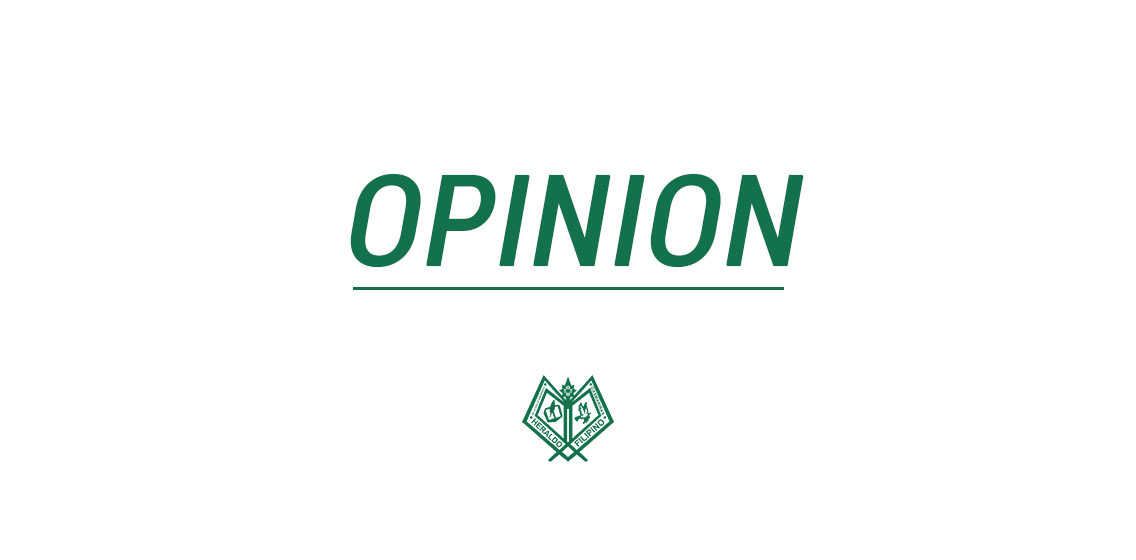Don’t Look Up: A satirical blow to reality
Written, produced, and directed by Adam McKay, the star-studded comedy disaster Don’t Look Up offers a science-fiction take that feels realistic enough to resemble a real-world response to a global crisis. Following the grave threat of a comet hurtling towards the Earth, the satirical film underscores the importance of science now more than ever, and how neglecting potential dangers for the sake of power could make the difference between life and death.
Life has never been the same after astronomy professor Randall Mindy (Leonardo DiCaprio) and his student Kate Dibiasky (Jennifer Lawrence) discovered a comet set to make a direct collision towards the planet in just six months. With little time left for mankind to take preemptive measures, their only hope is to negotiate with leaders and influential figures in different industries, each holding key roles in saving the world from the extinction-level comet.
Informing the agency responsible for astronomy and space research, Mindy and Dibiasky broke the information to the National Aeronautics and Space Administration (NASA) first and foremost, and worked with its Planetary Defense Coordination Office Head Dr. Teddy Oglethorpe (Rob Morgan). However, despite the urgency of the discovery and its deadly dangers to human life, government leaders through its fictional US President Janie Orlean (Meryl Streep) and Chief of Staff Jason Orlean (Jonah Hill) who both took the threat lightly – a highlight within the film that hits too close to home. Drawing parallels from fiction to reality, this mirrors how world leaders first responded with false confidence to the newly discovered strain of coronavirus, resulting in numerous hits and misses that we know of.
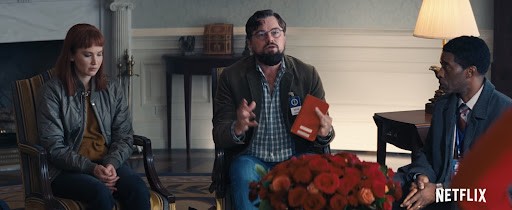
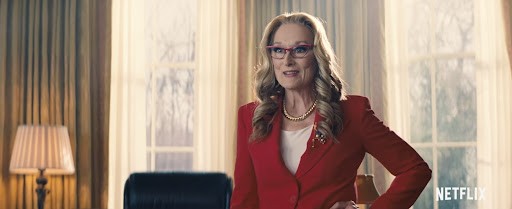
Images taken from Don’t Look Up Netflix official teaser trailer on YouTube
As the film progresses, we only see more and more of their questionable strategies and motivations while Mindy and Dibiasky race against time. Initially, President Orlean had been hesitant to take part in the mission, but tables quickly turned when she saw them as a leverage for the elections, thus saving her already deteriorating political career. Unmasking different faces of incompetence and selfishness, this begs the question on the intentions of our leaders regarding the welfare of the nation – especially when calls for genuine crisis response turn into public relations and political stunts.
Given the initial stance of the US administration within the film, the course of events seemed too good to be true when the president finally agreed to a project that will deflect the comet using nuclear weapons. But as the interests of those in power continued to prevail over the interests of their people, the mission was purposely aborted due to CEO of the technology company BASH Peter Isherwell (Mark Rylance) discovering trillion-dollars worth of minerals in the life-threatening comet. Fragmenting the comet for the mineral harvest will create jobs and end poverty, Isherwell claimed, but the frightening risk of extinction remains. This exemplifies how the decisions of those in power can put us in more danger, as mismatched priorities and improper resource allocation only bring more trouble than it’s worth. After all, who will benefit from the equal opportunity promised when the planet goes to a massive extinction? Well, according to Don’t Look Up, the answer’s pretty clear.
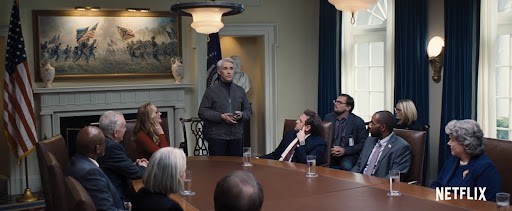 Image taken from Don’t Look Up Netflix official teaser trailer on YouTube
Image taken from Don’t Look Up Netflix official teaser trailer on YouTube
On the other hand, Mindy and Dibiasky did not only have a fair share of difficult times in negotiating with leaders, but also with the media. Bringing the discovery to the consciousness of the public as their core mission, they took the matter to the wide mileage of a hit television show – only to downplay and mock their groundbreaking discovery.
 Image taken from Don’t Look Up Netflix official teaser trailer on YouTube
Image taken from Don’t Look Up Netflix official teaser trailer on YouTube
More interested in trivial issues and drama, the film also showcased the dismissive attitude of large and capitalist institutions to issues that matter. Dibiasky’s outburst on national television, as well as the mockery that came after, sends a spine-chilling message about how media, especially mainstream outlets in particular, are sometimes driven by what rates and sells and not by issues that concern public welfare.
As one of the largest contributors in forwarding truth, it takes a collective effort from the government, media, and other powerful institutions to raise public awareness and action on occurrences that seem to be unbelievably true, but pose dangerous consequences in reality. Despite the tireless efforts and credibility of scientists, Don’t Look Up unravels an unfortunate reality on how they barely call the shots and hold the power in managing deadly crises. The issue of effectively coming up with concrete plans and strategies in confronting a crisis boils down to the governance, accountability, and competency of our leaders – those who have the influence and machinery to make people believe in science, and make informed decisions.
***
Exposing how the decision-making of our leaders drastically affects the present and the future, Don’t Look Up encourages us to think critically about the social responsibilities of those in power. Scientific discoveries can do so much, but it is competent governance that will ultimately turn those discoveries into workable policies, and make effective use of the public’s resources. In many ways, Don’t Look Up serves as a satire as well as a warning: where public welfare and safety is concerned, incompetence and pursuit of personal gains can be just as deadly as an extinction-level comet – or in our case, a pandemic.
Slider taken from Don’t Look Up Netflix official teaser trailer on YouTube


